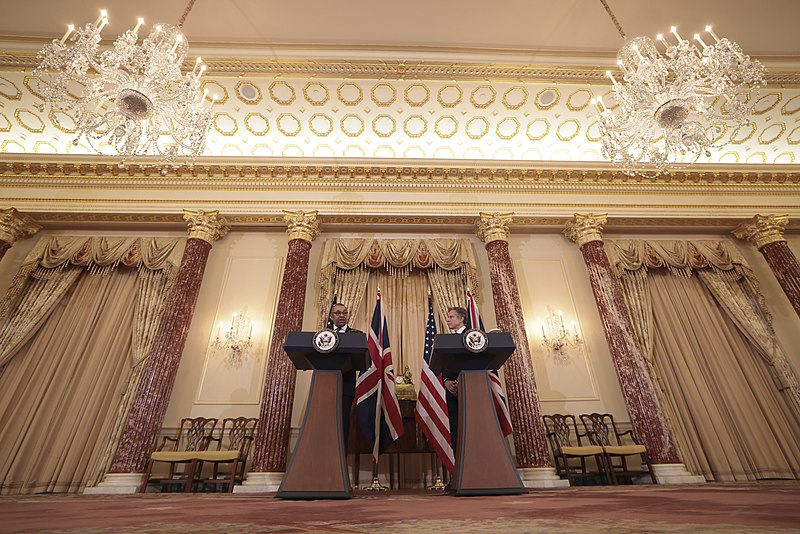US Secretary of State Antony Blinken said Washington welcomed the progress that was made so far between the United Kingdom and the European Union in the ongoing talks on the Northern Ireland trade deal. Blinken’s comments come amidst optimism from both sides in reaching a solution to the issues surrounding the deal.
In a joint news conference with British Foreign Secretary James Cleverly after the meeting in Washington, Blinken said Washington welcomes the progress made so far on the ongoing talks. Blinken also reiterated the US stance that there must be a solution that is acceptable to all parties involved. Cleverly and Blinken’s meeting mostly focused on support for Ukraine, but the two top diplomats discussed other key issues, such as the ongoing talks on the trade deal.
“And we’re heartened that in recent days the United Kingdom and the European Union have made substantive progress toward a negotiated solution,” Blinken told reporters.
Cleverly said he updated Blinken on the talks that he described were done “in good faith with a genuine desire to get resolution to these important issues.”
While US President Joe Biden has often highlighted the importance of maintaining the 1998 Good Friday Agreement, US officials said Washington would not take sides on the matter of the post-Brexit trade deal between the UK and the bloc. The UK and the EU agreed on Monday to move forward with the talks even as there are still gaps that remain between both sides after a months-long deadlock.
The British Prime Minister’s office said on Tuesday that Prime Minister Rishi Sunak would not be extending the deadline to replace the remaining European Union laws that are in place even after the UK left the bloc. The debate on the legislation to replace EU laws is set to happen on Wednesday amidst criticism from those opposed that it could result in a weakening of protections that existed through the country’s EU membership.
The government said the legislation was not aimed at watering down such protections but instead would create a regulatory environment that will fuel economic growth. The most important provision in the bill automatically invalidates secondary retained EU law by December 31, which led to uncertainty among businesses and the concern that the scale of replacing EU laws would take up government resources.



 Pentagon Ends Military Education Programs With Harvard University
Pentagon Ends Military Education Programs With Harvard University  Trump Backs Nexstar–Tegna Merger Amid Shifting U.S. Media Landscape
Trump Backs Nexstar–Tegna Merger Amid Shifting U.S. Media Landscape  U.S. Lawmakers to Review Unredacted Jeffrey Epstein DOJ Files Starting Monday
U.S. Lawmakers to Review Unredacted Jeffrey Epstein DOJ Files Starting Monday  Netanyahu to Meet Trump in Washington as Iran Nuclear Talks Intensify
Netanyahu to Meet Trump in Washington as Iran Nuclear Talks Intensify  Trump Says “Very Good Talks” Underway on Russia-Ukraine War as Peace Efforts Continue
Trump Says “Very Good Talks” Underway on Russia-Ukraine War as Peace Efforts Continue  Ohio Man Indicted for Alleged Threat Against Vice President JD Vance, Faces Additional Federal Charges
Ohio Man Indicted for Alleged Threat Against Vice President JD Vance, Faces Additional Federal Charges  Norway Opens Corruption Probe Into Former PM and Nobel Committee Chair Thorbjoern Jagland Over Epstein Links
Norway Opens Corruption Probe Into Former PM and Nobel Committee Chair Thorbjoern Jagland Over Epstein Links  U.S. to Begin Paying UN Dues as Financial Crisis Spurs Push for Reforms
U.S. to Begin Paying UN Dues as Financial Crisis Spurs Push for Reforms  Missouri Judge Dismisses Lawsuit Challenging Starbucks’ Diversity and Inclusion Policies
Missouri Judge Dismisses Lawsuit Challenging Starbucks’ Diversity and Inclusion Policies  TrumpRx.gov Highlights GLP-1 Drug Discounts but Offers Limited Savings for Most Americans
TrumpRx.gov Highlights GLP-1 Drug Discounts but Offers Limited Savings for Most Americans  China Warns US Arms Sales to Taiwan Could Disrupt Trump’s Planned Visit
China Warns US Arms Sales to Taiwan Could Disrupt Trump’s Planned Visit  U.S.-India Trade Framework Signals Major Shift in Tariffs, Energy, and Supply Chains
U.S.-India Trade Framework Signals Major Shift in Tariffs, Energy, and Supply Chains  India–U.S. Interim Trade Pact Cuts Auto Tariffs but Leaves Tesla Out
India–U.S. Interim Trade Pact Cuts Auto Tariffs but Leaves Tesla Out  New York Legalizes Medical Aid in Dying for Terminally Ill Patients
New York Legalizes Medical Aid in Dying for Terminally Ill Patients  Trump Signs Executive Order Threatening 25% Tariffs on Countries Trading With Iran
Trump Signs Executive Order Threatening 25% Tariffs on Countries Trading With Iran  Trump Endorses Japan’s Sanae Takaichi Ahead of Crucial Election Amid Market and China Tensions
Trump Endorses Japan’s Sanae Takaichi Ahead of Crucial Election Amid Market and China Tensions  Antonio José Seguro Poised for Landslide Win in Portugal Presidential Runoff
Antonio José Seguro Poised for Landslide Win in Portugal Presidential Runoff 































